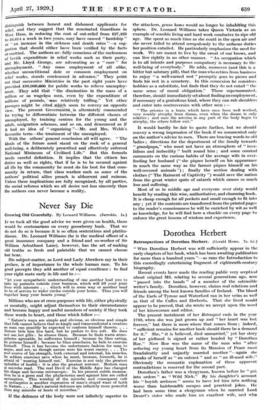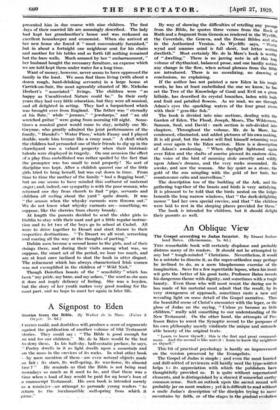Dorothea Herbert Retroapections of Dorothea Herbert. (Gerald Howe. 7s. ikl.)
" WHO Dorothea Herbert was will sufficiently appear in the early chapters of her book, which has been awaiting publication
for more than a hundred years "—so runs the Introduction to this exceedingly entertaining fragment of eighteenth-century biography. • Recent events have made the reading public very sceptical about original MS. relating to several generations ago, now " passed into the hands " of a member of the ostensible writer's family. Dorothea, however, claims real relations and friends among the best known families of Ireland. The blood of the Earls of Tyrone and Waterford ran in her veins as well as that of the Cuffes and Herberts. That she lived would appear to be proved, that she wrote we accept upon the word of her kinswoman and editor.
The present instalment of her Retrospect ends in the year 1789, when she was just grown up and " her heart was lost forever," but there is more where that comes from ; indeed, " sufficient remains for another book should there be a demand for it." She, " it is believed, died unmarried," yet her story of her girlhood is signed or rather headed by " Dorothea Roe." Now Roe was the name of the man who " after seducing my young heart from its Mansion of Peace most fraudulently and unjustly married another "—again She speaks of herself as " an outcast " and as " an ill-used wife." Obviously the romantic explanation of these apparent contradictions is reserved for the second part.
Dorothea's father was a clergyman, known before he " got into orders " as " Wild Nick." By his daughter's account his boyish archness " seems to have led him into nothing worse than hairbreadth escapes and practical- jokes. He had been some time a clergyman. when he married Lord Desert's sister who made him an excellent wife, and who presented him in due course with nine children. The first days of their married life are amusingly described. The lady had kept her grandmother's house and was reckoned an excellent housekeeper and economist. When she arrived at her new home she found it " most conveniently furnished," but in about a fortnight one neighbour sent for his chairs and another for his tables and so forth till nothing remained but the bare walls. Much amused by her " embarrassment, " her husband bought the necessary furniture, an expense which we are told kept them under water for a long time.
Want of money, however, never seems to have oppressed the family in the least. We soon find them living (with about a dozen rough, hard-drinking servants) in a large house at Carrick-on-Suir, the most agreeably situated of Mr. Nickolas Herbert's ". associated " livings. The children were " as happy as Uncultivated Nature could be." In their early years they had very little education, but they were all musical, and all delighted in acting. They had a harpsichord which was brought over from England. The father was " eternally at his flute," while " jocanes," " jewsharps," and " an old wretched guitar " were going from morning till night: Some- times a musical guest would come to stay, notably one Mr. Gwynne, who greatly admired the joint Performances of the family. " Handel' s Water Piece,' which Fariny and I played double, made him bounce like a` crazy Man." A skiill which the children had persuaded one of their friends to dig up in the churchyard was a valued property when their histrionic talents were displayed in tragedy. On one occasion the effect of a play thus embelliShed was rather spoiled by the fact. that the prompter was too small to read properly! ' No sort of discipline was kept. After a childish quarrel one of the little girls tried to hang herielf, but was cut down in time. Froth time to tithe the mother of the family " had a flogging bed," but no One seems to have minded this- outburst of maternal anger; and, indeed, our sympathy is with the poor woman, who returned one day froni church to fmd " pigs, servants and children all reeling abOut the yard " quite drunk. It was " the season when the whysky currants were thrown out." We do not know what whySky currants arc—something, we suppose, like the cherries from cherry brandy.
At length the parents decided to send the elder girls to Dublin to-stay with their aunt and get a little regular instruc- tion and to let two of the boys go to school at Cashel. All Were to drive together to Desart and start thence to their respective destinations. " To Desart we all went, screeching and roaring all the way at the thoughts of parting."
Dublin soon became a second hoine to the girls, and of their doings there, and during their visits among what was, we suppose, the smart set of the period, we hear too much, and are at least once inclined to shut the book in utter disgust. The refinement Which hai always characterized Irish women was not exemplified in the children of " Wild Nick." Though Dorothea boasts of the " sensibility '4 which has been "my pride, my bane, and my solace," the word as she uses it does not imply delicacy of feeling. She was a hoyden, but the story of her youth makes very good .reading for the most part, and we hope to meet her again in later life.









































 Previous page
Previous page